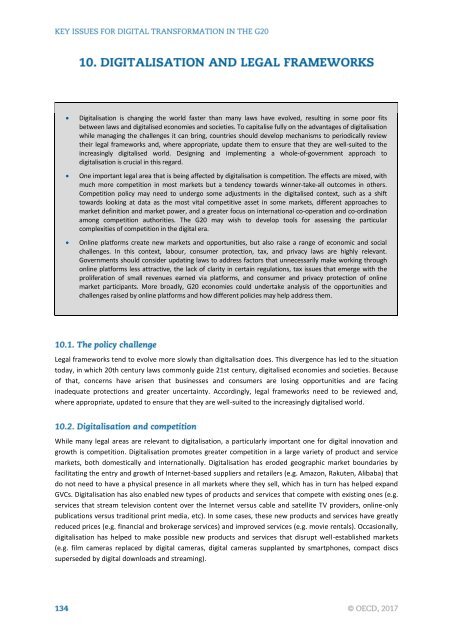KEY ISSUES FOR DIGITAL TRANSFORMATION IN THE G20
2jz0oUm
2jz0oUm
Create successful ePaper yourself
Turn your PDF publications into a flip-book with our unique Google optimized e-Paper software.
Digitalisation is changing the world faster than many laws have evolved, resulting in some poor fits<br />
between laws and digitalised economies and societies. To capitalise fully on the advantages of digitalisation<br />
while managing the challenges it can bring, countries should develop mechanisms to periodically review<br />
their legal frameworks and, where appropriate, update them to ensure that they are well-suited to the<br />
increasingly digitalised world. Designing and implementing a whole-of-government approach to<br />
digitalisation is crucial in this regard.<br />
One important legal area that is being affected by digitalisation is competition. The effects are mixed, with<br />
much more competition in most markets but a tendency towards winner-take-all outcomes in others.<br />
Competition policy may need to undergo some adjustments in the digitalised context, such as a shift<br />
towards looking at data as the most vital competitive asset in some markets, different approaches to<br />
market definition and market power, and a greater focus on international co-operation and co-ordination<br />
among competition authorities. The <strong>G20</strong> may wish to develop tools for assessing the particular<br />
complexities of competition in the digital era.<br />
Online platforms create new markets and opportunities, but also raise a range of economic and social<br />
challenges. In this context, labour, consumer protection, tax, and privacy laws are highly relevant.<br />
Governments should consider updating laws to address factors that unnecessarily make working through<br />
online platforms less attractive, the lack of clarity in certain regulations, tax issues that emerge with the<br />
proliferation of small revenues earned via platforms, and consumer and privacy protection of online<br />
market participants. More broadly, <strong>G20</strong> economies could undertake analysis of the opportunities and<br />
challenges raised by online platforms and how different policies may help address them.<br />
Legal frameworks tend to evolve more slowly than digitalisation does. This divergence has led to the situation<br />
today, in which 20th century laws commonly guide 21st century, digitalised economies and societies. Because<br />
of that, concerns have arisen that businesses and consumers are losing opportunities and are facing<br />
inadequate protections and greater uncertainty. Accordingly, legal frameworks need to be reviewed and,<br />
where appropriate, updated to ensure that they are well-suited to the increasingly digitalised world.<br />
While many legal areas are relevant to digitalisation, a particularly important one for digital innovation and<br />
growth is competition. Digitalisation promotes greater competition in a large variety of product and service<br />
markets, both domestically and internationally. Digitalisation has eroded geographic market boundaries by<br />
facilitating the entry and growth of Internet-based suppliers and retailers (e.g. Amazon, Rakuten, Alibaba) that<br />
do not need to have a physical presence in all markets where they sell, which has in turn has helped expand<br />
GVCs. Digitalisation has also enabled new types of products and services that compete with existing ones (e.g.<br />
services that stream television content over the Internet versus cable and satellite TV providers, online-only<br />
publications versus traditional print media, etc). In some cases, these new products and services have greatly<br />
reduced prices (e.g. financial and brokerage services) and improved services (e.g. movie rentals). Occasionally,<br />
digitalisation has helped to make possible new products and services that disrupt well-established markets<br />
(e.g. film cameras replaced by digital cameras, digital cameras supplanted by smartphones, compact discs<br />
superseded by digital downloads and streaming).


